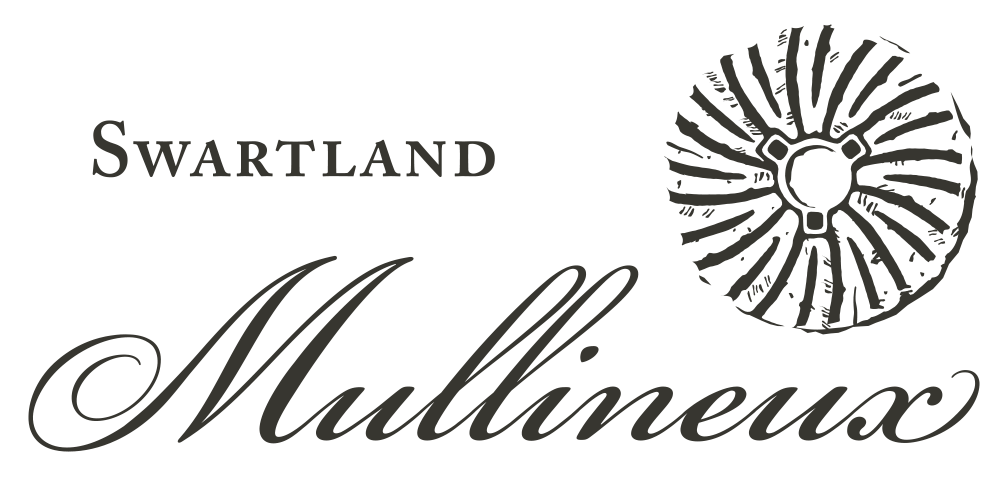Mullineux Signature, Signature Straw Wine


Vintage: 2023
| Vintage | Product Code | Format | Closure | Availability |
|---|---|---|---|---|
| 2023 | MU105H23 | 6 x 37.5 | Natural Cork | Available |
Producer
Founded by Chris and Andrea Mullineux in 2007, Mullineux is one of the most lauded wineries in South Africa, having been named ‘Winery of the Year’ five times by the Platter Guide (in 2014, 2016, 2019, 2020 and 2023). Chris and Andrea chose the town of Riebeek-Kasteel, just west of Malmesbury in the Swartland, due to its old vineyards planted on granite and schist soils. They reasoned that, with such quality fruit, they could make outstanding wines. It is an understatement to say they have been proved right.
The Swartland is warm and dry in the summer, benefitting from a cooling afternoon breeze from the Atlantic Ocean, which borders the region to the West. Disease pressure is low, which, in turn, means spraying is kept to a minimum. The fashion for monoculture in the 1970s and 1980s bypassed the Swartland. As a result, most of the vineyards that Chris and Andrea own, or lease are planted with numerous native species like fynbos. These provide a home for native insects, which act as predators of other insects that can damage the vines. Again, this enables spraying to be kept to a minimum.
The Mullineux Range boasts a Syrah, an ‘Old Vines’ White and a ‘Straw Wine’. The Syrah blends fruit from schist, iron and granite soils across a range of Swartland vineyards. 90% of the fruit is whole bunch fermented, with maceration extended to as long as seven weeks for some batches simply because of the quality of the tannins. This creates a lovely structure and balance to the wine, with the tannins corseting ripe and voluptuous fruit. The wine is aged in oak, 15% of which is new, for 14 months before bottling. The ‘Old Vines’ White is sourced from seven low-yielding (4-6 tonnes per hectare) vineyards in the Swartland. It is predominantly Chenin Blanc, blended with a touch of Semillon Gris, Clairette Blanche, Grenache Blanc, Viognier, and Verdelho. The winemaking is similar to the Single Terroir Chenins, using whole bunch pressing and fermentation in barrel with 100% malolactic. The resulting wine is aged for 11 months in a combination of old French oak 500-litre barrels and 2,000-litre foudre. Their ‘Straw Wine’ is made from old vine Chenin Blanc harvested at normal ripeness levels and air-dried for three to four weeks, concentrating the sugars, flavours and, most importantly, acidity. The wine is slowly pressed and fermented in old barrels for six to nine months, before natural settling and bottling. The resulting wine has an intense nose of dried fruit, marmalade, marzipan and honey. On the palate, it is powerful and complex, with around 300 grams per litre of residual sugar balanced by a vibrant acidity, leaving the wine tasting fresh and dry. Mullineux’s ‘Olerasay’ Straw Wine is undoubtedly one of the world's great sweet wines and incredibly rare. Produced from barrels which have been fractionally blended for the vintages 2008 through to 2022, it has layers of complexity, nuttiness and depth.
Vineyards
This wine is made from vineyard parcels which have been specially selected for their ability to yield fruit with lifted acidity to balance out this sweet wine. One parcel is 42-year-old Chenin Blanc, grown on the stony shale- and schist-based soils of the Kasteelberg and the other is 46-year-old dry land bush vines from the decomposed Granite of the Paardeberg. The old, bush-trained wines provide complex fruit with concentrated sugars, ideal for this style.
Vintage
The 2023 vintage saw some heatwaves throughout the growing season, but cool evenings and very little precipitation assisted in maintaining the vine health despite the heat. Cool weather near harvest allowed for a slow and gradual ripening period which developed beautifully concentrated berries.
Vinification
Grapes were hand harvested at normal ripeness level of 23 Brix then left to dry in the shade outdoors for 16 to 30 days. This allowed moisture to evaporate naturally from the berries, concentrating sugars, acids and flavour. When the grapes had shrivelled half way to becoming raisins, they were crushed and pressed as whole bunches, and racked to old 225 litre barrels. Fermentation took around 11 months, slow due to the high sugar content in the must, and stopped naturally when the yeast could not ferment further. Afterwards, the barrels were racked, blended, and bottled unfiltered and unfined.
Tasting Notes & Technical Details
In the glass, this wine is bright gold in colour with a rich, viscous quality. On the nose, it is a complex, enticing blend of dried apricots, lemon pie and orange peel. Velvety mouthfeel and luscious sweetness on the palate are balanced by mouth-watering acidity and purity of fruit.
Alcohol (ABV)
7.5%
Acidity
11.4 g/l
Residual Sugar
336 g/l
pH
3.41
Other wines from this producer
Producer | Wine | Product Code | Features | Style | |
|---|---|---|---|---|---|
| Signature | Old Vines Swartland White Blend | MU103 | W | Factsheet | |
| Swartland Syrah | MU104 | R | Factsheet | ||
| Olerasay 3º Straw Wine Chenin Blanc | MU117 | Sw | |||
| Single Terroir | `Granite` Swartland Chenin Blanc | MU106 | W | Factsheet | |
| `Granite` Swartland Syrah | MU108 | R | Factsheet | ||
| `Schist` Swartland Syrah | MU109 | R | |||
| `Iron` Swartland Syrah | MU110 | R | Factsheet | ||
| `Schist` Swartland Chenin Blanc | MU115 | W | Factsheet |